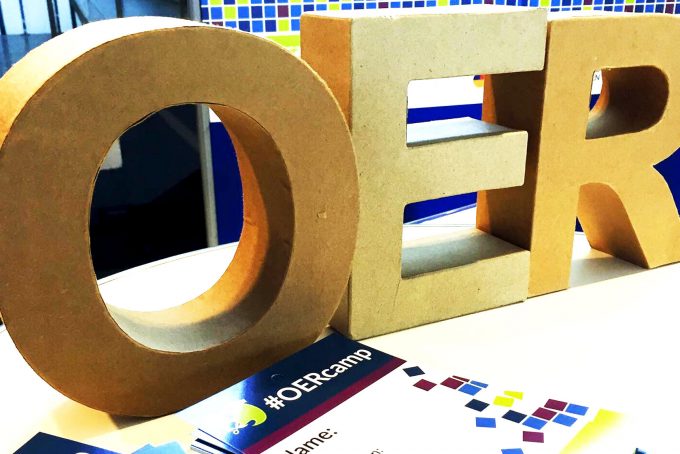
Open Science Movement: How “HackYourPhD” Fosters Open Science in France and Abroad
Open science emerged mainly from grass-roots organizations. "HackYourPhD" is a France-based worldwide community of open science activists. Guillaume Dumas, Célya Gruson-Daniel and Matthieu Le Chanjour answered our interview questions on the community’s mission and activities. They also told us how they perceived the shift from a mainly grass-roots movement to open science as a trending topic in research policy.
we were talking with Guillaume Dumas, Célya Gruson-Daniel and Matthieu Le Chanjour
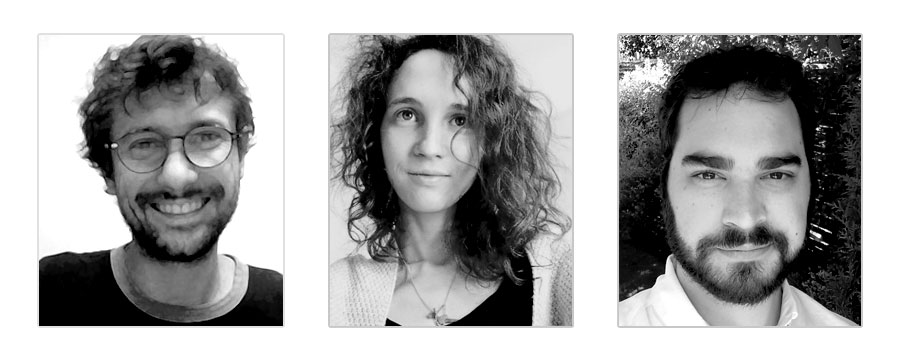
“HackYourPhD” is a worldwide open science community. We asked its co-founders, Guillaume Dumas and Célya Gruson-Daniel, and its secretary, Matthieu Le Chanjour, about “HackYourPhD’s” mission, its actions and benefits.
What is “HackYourPhD”? What is your mission and what actions do you take?
“HackYourPhD” is a worldwide community setup around the question of “open science” since 2012. We also have created a legal association in France.
Our “HackYourPhD” manifesto sums it up: “We believe it is important to show that new ways of doing research exist, and can only benefit research itself as well as the relationship between science and society. We do not seek to revolutionize research, but rather question how it works and add complementary bricks so that it may adapt better to today’s world and respond in a well-adapted fashion to the scientific and human issues of tomorrow.”
Basically, we foster collective thinking about how we practice and share research today in a digital world. This is made through multiple actions:
- Collaborative curation
- Meetings and documentation about open science through creative formats
- Networking and interviews with people who are making open science happen in France and abroad.
See for example our flyers which share our vision of open science as a societal issue to everyone or our book “HackYourPhD”: profile of young researchers of the #OpenScience generation” (PDF).
Who is part of the “HackYourPhD” community? Whom is it made for? What are the benefits of being a member?
Its participants are people from different backgrounds interested in understanding how science works: curious citizens, PhD students, fully established researchers, journalists, entrepreneurs.
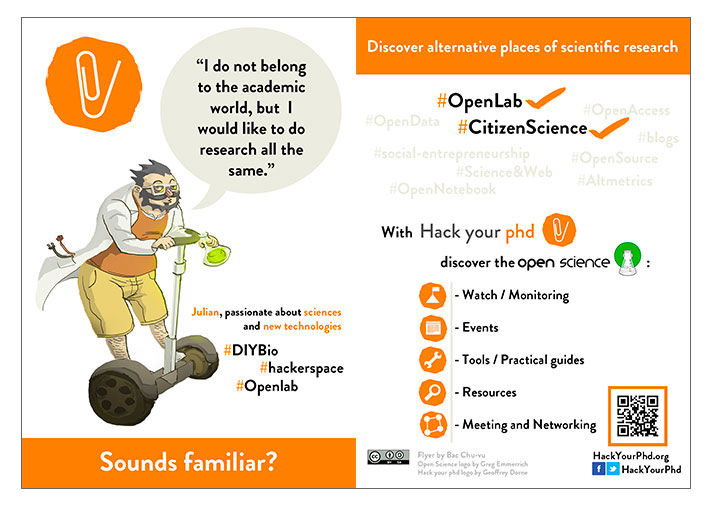
At the origin, the community was initiated by people invested in the cognitive science field (STM) and scientific communication. Afterwards other members from social sciences, humanities joined the organization.
- “HackYourPhD” brings together students, young researchers, engaged citizens, hacktivists, tinkerers from all horizons, entrepreneurs, and everyone who is interested in the production and the sharing of knowledge in the wider sense. This collective aims to bring concrete solutions to complex issues and to build much-needed collaborative relationships between those involved in knowledge production. This is required to make collective intelligence to come into existence and bring answers to urgent issues of society.
- We wish, through common activities carried out by members of the community, to create healthy dynamics among researchers and to open the “black box” so that may serve society rather than entrenched interests.
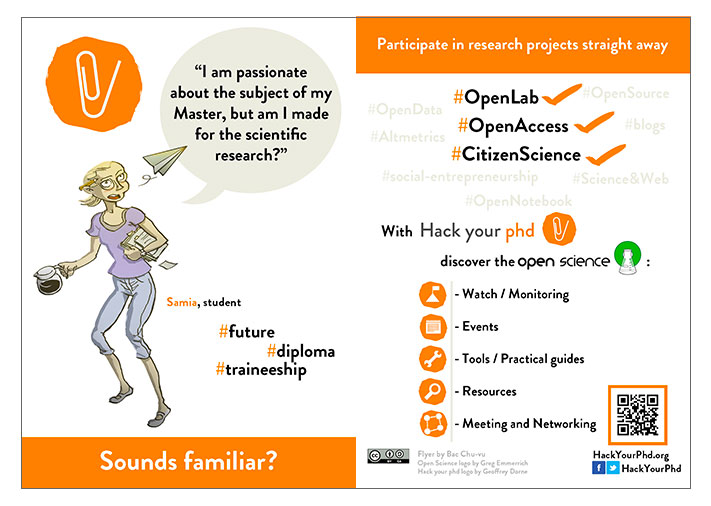
The benefits are mainly to take a step back and to reflect what science and research means, and to have the opportunity to learn new digital practices in research (programming) while understanding the socio-political stakes of using these methods and free and open source software. You can for instance check our digital literacy programme called “Open Geek”.
Is “HackYourPhD” a worldwide initiative or is it mainly active in France and the United States?
We are mostly active in France but connected with an international network. We consider “HackYourPhD” as a “porte d’entrée” to meet other communities in Africa and India with OCSD network and APSOHA, Asia with the CRI, USA and Canada with Force11, and l’association science ouverte). In 2014, Célya Gruson-Daniel went also on tour across North America to meet people involved in the blooming open science community. She made a travel log called “HYPhD aux States” from this journey.
We are also very active in disseminating through our website and social media, especially our Facebook group “Hack your Phd” and our Twitter account @HackYourPhd.
Does “HackYourPhd” receive any funding?
The community has always been composed of volunteers and the association benefits from their contribution (5 euros per member/per year). We do not have other funding, for now. However, we organized a successful crowdfunding campaign in the past. For a project named “HackYourPhD aux States”, we raised more than 5,000 euros (more than expected) for a web-documentary traveling around the United States to meet people involved in open science.
What are your recent activities?
Our recent activities have been the organization of Open Geek sessions (more than 20 workshops in 2 years to learn programming in python and the basics of open and data science). See our Github. Our events have been organized mostly with La Paillasse (a citizen and DIY Science lab) but also with other research and scholarly organizations. For the Zotero workshop, the session has been co-hosted by a library and a social sciences community. The cake reports training: Useful Open Science tools to do research in psychiatry (PDF) has been co-hosted with the European Psychiatric Association Congress.
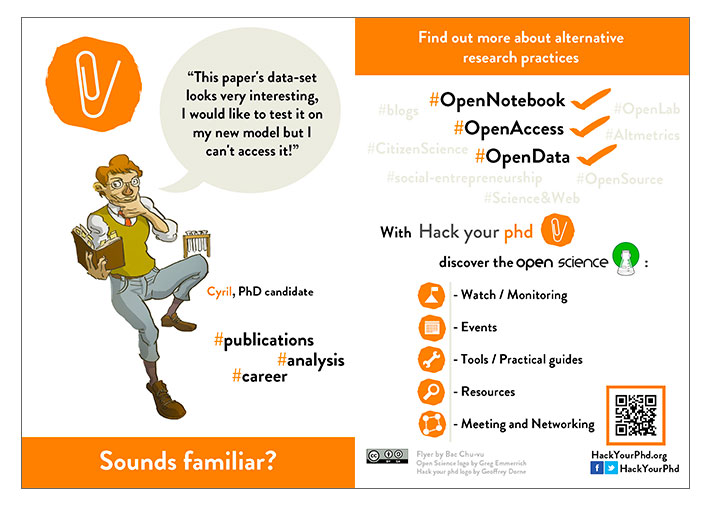
Several of our members have been invited to present “HackYourPhD” and share their knowledge about open science during conferences, workshops as the MozWow organized with Pasteur Institute and Mozilla Science Lab, or the Science Shakers event (apéro with scientific communication professionals).
We also shared our practical knowledge during workshops (markdown and editing during an Hackarnaval and the Journées du réseau Médici for public scientific publishing professional in France.
We also co-organized an event at ESOF 2018 (EuroScience Open Forum) about the interactions between hackers/makers and institutions. It led to the editing of guidelines to foster fruitful exchanges between research institutions and hackers/makers communities.
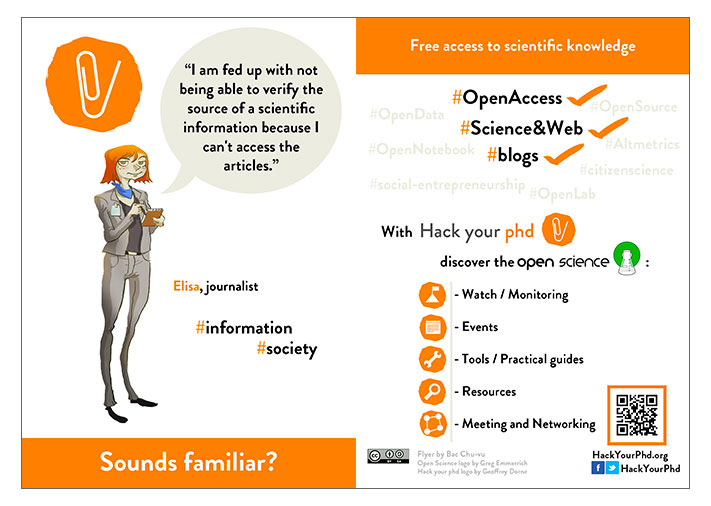
More recently, we have started to organize special events (not only in Paris where the main events were happening initially) but in other cities in France like Montpellier or Strasbourg.
How do you organize the “HackYourPhD” community, discussions and activities?
Our activities are at the same time online and offline. We meet at least once a year in person to decide collectively the main orientations of the community. Then we often work in twos or in groups of more people on the various projects. We exchange mostly online using our mailing list. Our organization is based on collective governance; we make decisions in a collegial way. To communicate broadly, we use social media like Facebook or Twitter. Our Facebook group is also actively exchanging about the topics we share in the timeline. Of course, events in real life are an important moment to gather the community but also to meet people involved in other projects and to start new collaborations.
How do you advocate open practices?
Sometimes, we are kindly asked to (see the podcast of Célya Gruson-Daniel on the bigger picture of Open Science. We encourage discussions among a panel of various profiles and create frames for fruitful debate and information about tools, examples, controversies and scientific research related to open practices. We also enjoy using illustrations and humor to engage our audiences.
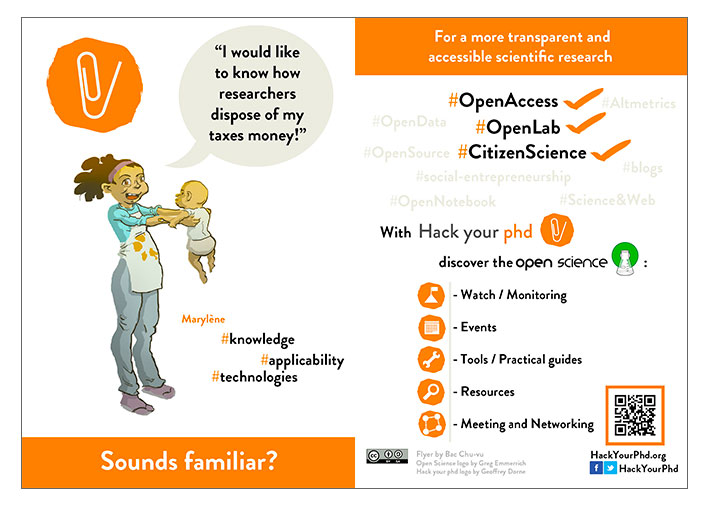
We create educational and informative contents. Since some of our members have been practicing open science for a few years, we also learn a lot from the experience of every person we meet, be them academics or not. Active lobbying is one of our main activities. We aim to shed a light on the development of open science practices and how it can benefit societies and also how, sadly, it can be misused.
What challenges and barriers do you face?
The initial idea of “HackYourPhD” has emerged 5 years ago. At this time Open Science was mainly led by grass-root organizations, before it became a trending topic and a major point of research policy. Thus, we have been witnessing the evolution of open science and have also studied it (the doctoral research of one of the co-founders was about this topic). We have observed how grass-root organizations have lost their initial motivation for several reasons (cognitive saturation, lack of time and funding).
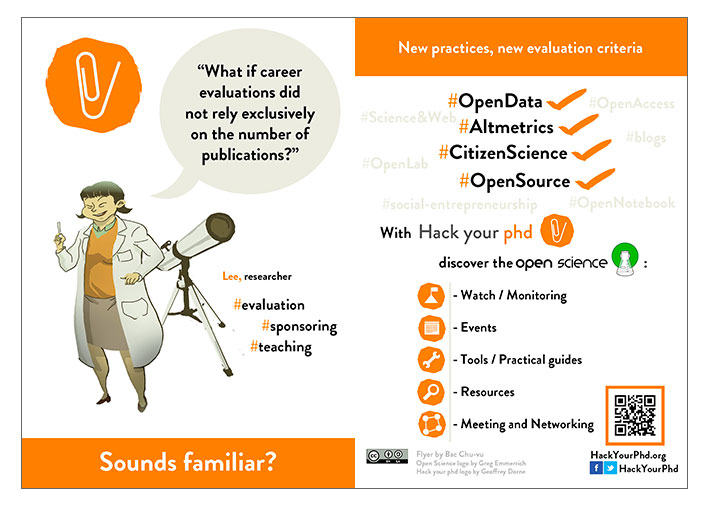
We are happy to still be active with new members who share their enthusiasm and motivation for new projects. One of the challenges would be to become more sustainable and to remunerate our members who spent days and days for this project, while keeping the fluidity and collective governance. For that, we are interested in new organizational models inspired by ideas developed by the social economy and the commons.
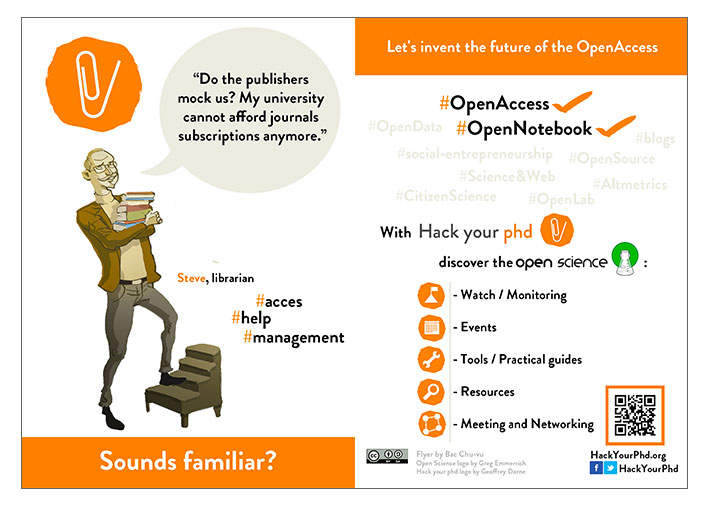
It is also important to make people understand that openness doesn’t mean free and that we need economic models based on openness which are societally and ethically valuable. Two other challenges remain, for data the ethical misunderstanding that you cannot openly share data of people without their proper consent, and for software the false idea that open source is worse because “If it is open, it can’t be as good.”
We were in discussion with: Guillaume Dumas, Célya Gruson-Daniel and Matthieu Le Chanjour.
Guillaume Dumas (Co-founder / Vice-President) is a faculty researcher at the Pasteur Institute in cognitive neurosciences and systems biology. He is interested in social coordination dynamics and how their theoretical understanding can be applied to foster the open science movement. He also works in large scale collaborative efforts in biomedical research, advocating open practices from data sharing to reproducibility.
Célya Gruson-Daniel (Co-founder / President) graduated from Ecole Normale Supérieure. She just defended a PhD at the Centre de Recherche Interdisciplinaire based in her work on open science between France (UTC Costech Lab) and Québec (Université Laval). She is also a research engineer at the Centre Virchow-Villermé in Paris (Open and Digital Science Project Manager).
Matthieu Le Chanjour (Secretary) is a science educator specialised in pedagogical engineering since 2011 and TV author based in Brittany. He is passionate about astronomy, brain sciences, history and exchanging all forms of knowledge. He’s also a freelance science journalist and an entrepreneur in the field of science education, professional training and industrial prototyping.
All graphics made by members of “HackYourPhD” and with the help of the graphic designer Bac Chu Vu.
View Comments
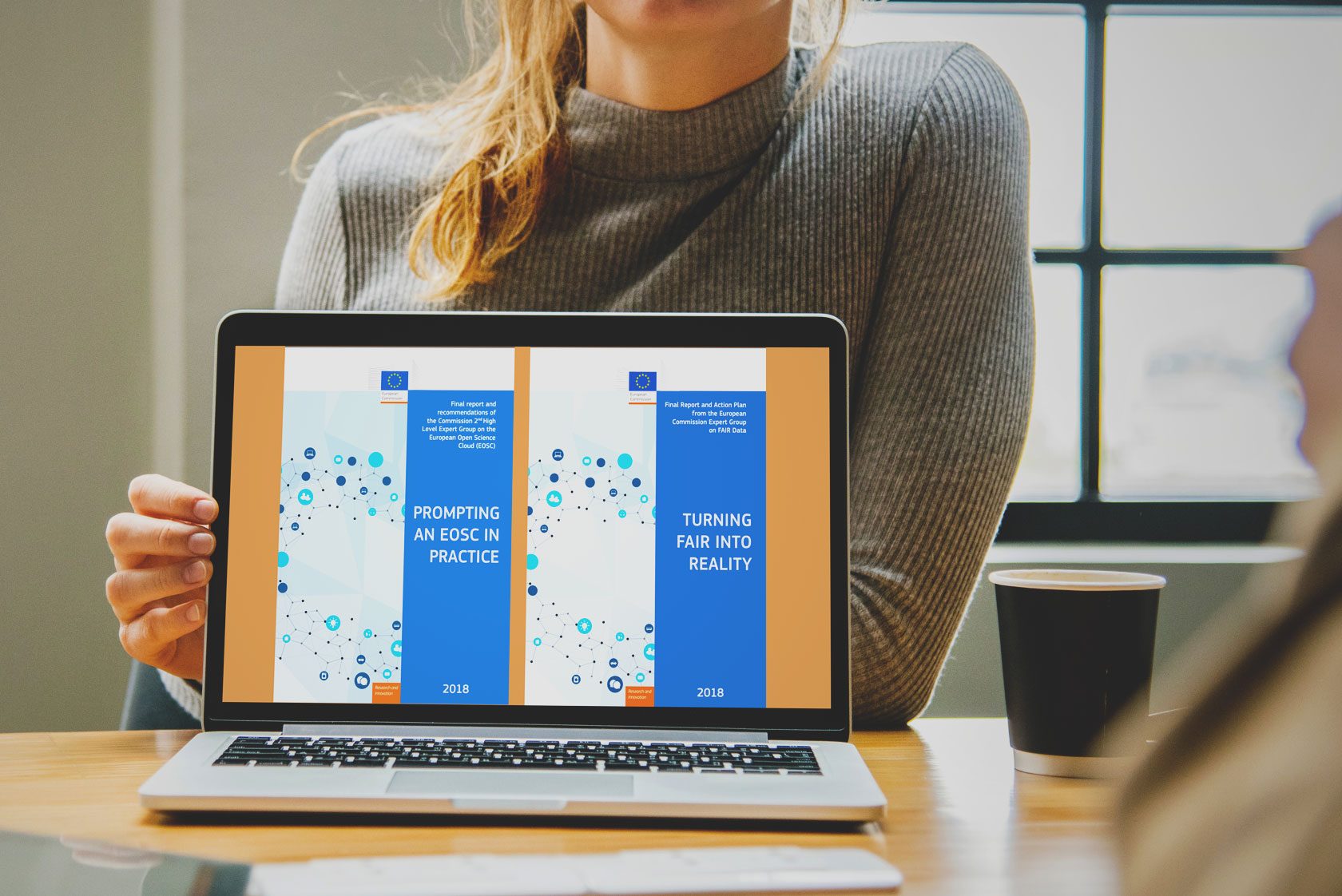
New Open Science Reports: How to put EOSC and FAIR Into Practice
How could the European Open Science Cloud and FAIR be prompted into reality? What...


